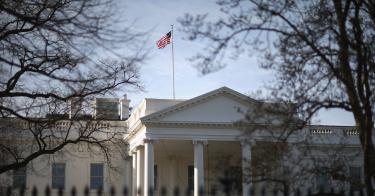Domestic issues always loom large at the start of a political new year and 2021 will be no different. A host of issues pile up during every campaign season and next year there will be COVID vaccine distributions to deal with, as well. That said, there will be some global issues that can’t be put on hold. Here is a short list.
1. Speaking Truth to China
The ideological struggle with the Beijing regime is not going away. Fundamentally, we believe in human rights, freely elected governments and free enterprise. Beijing does not. Indeed, it sees these necessities as negatives—obstacles to the expansion of its power and influence. We cannot understand China’s antipathy to the free world without honestly discussing the legitimate ideological differences that divide the two.
Yet open discussion of these differences makes many progressives uncomfortable. Today’s far-left is rooted in the 1960s’ radicalism that embraced Mao’s “little red book” of revolutionary doctrine. To disavow the intellectual underpinning of China’s communist regime puts the left at odds with parts of its U.S. coalition.
>>> Index of U.S. Military Strength
Yet, the U.S. must launch a clear-eyed, full-throated defense of freedom over communism or risk losing the moral high ground in the competition with China.
2. Dealing with Iran
The 2020 presidential campaign revived demands from some quarters to “go back to the Iran Deal.” That’s a lot easier said than done.
What are you going to do about all the cheating that’s occurred? Do we really want to lift the arms embargo? Are we really going to ignore the ballistic missile threat?
What’s needed is a stronger deal, one that truly addresses proliferation concerns and Iran’s regional [mis]behavior. Without maximum pressure, the U.S. has no real leverage. Easing the pressure on Iran is to be avoided until a legit, verifiable deal is hammered out.
3. Protecting the Planet
Lots of folks on the left like the idea of the U.S. rejoining the Paris climate accords, but they haven’t made a compelling argument as to how re-upping the pact would actually help preserve our blue dot.
The fact is the U.S. is already a global leader in greenhouse gas reductions without being a member. China is the world’s biggest emitter and the single biggest threat to the environment.
The accord doesn’t restrain Beijing and other major emitters and allows them to continue on their business as usual pathways. Even in the unlikely event that every country fulfills its promises under the Paris Agreement, it would not address the problem of climate change as outlined by the U.N.
Rejoining an ineffective agreement only accentuates fears that this is an excuse to push a radical political agenda to remake America and cripple free markets, having little do with sound environmental policies.
Clamoring for the U.S. to rejoin a useless agreement only reinforces fears that this is a vehicle to push an extreme leftist agenda to remake America and cripple free markets in the name of “environmental justice.” Rather than just further divide Americans, our leaders must cultivate an honest debate about how to protect the planet through responsible policies that don’t demand a return to medieval living conditions in pursuit of Carbon Zero.
4. Getting Immigration and Border Policy Right
The last four years have shown that you can get illegal border crossing and immigration under control without a “grand bargain” on amnesty. All it took was following the law and closing loopholes exploited by human traffickers.
We’ve also learned that most Americans are just fine with that. They want secure borders. While the radical left dreams of an open borders agenda, that is not a policy that most Americans desire.
In fact, it’s more likely they will punish leaders that weaken the border, grant unfair privileges to illegal aliens, embolden the transnational cartels, create public health hazards with unregulated borders and open-ended migration in the middle of a pandemic.
Leaders who seek to dismantle border security risk reaping the wrath of a vast majority of Americans.
5. Peace through Strength
Over the last four years, we’ve pushed back against aggressive states like China, Russia and Iran—while winding down several wars and not starting any new ones. That was possible, in large part, because we started rebuilding our depleted military, becoming once again a power to be respected as a potent friend and a fearsome enemy.
The most dangerous move the U.S. could make is to not finish the job of rebuilding the military. It must be prepared to meet the challenges of the 21st century—the rising great-power competition, as well as the ongoing threat of transnational Islamist terrorism. Continuing to invest in our armed forces will send the right signal to the world. Stopping now would be the clearest signal imaginable that America has no appetite to lead.
This piece originally appeared in Fox News




